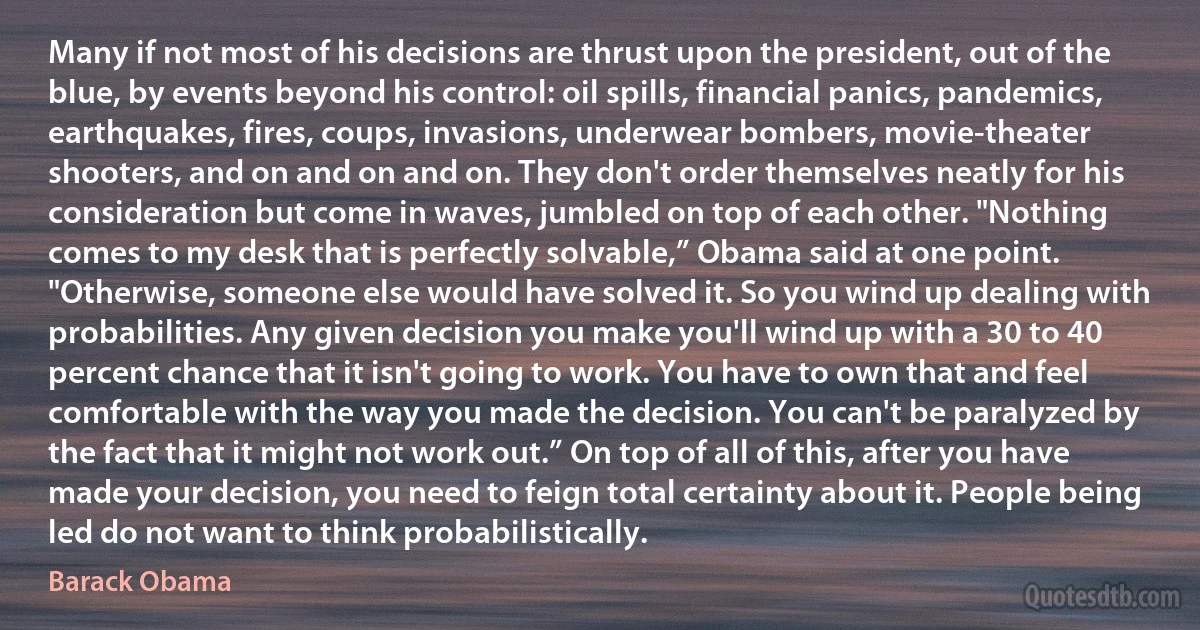
Many if not most of his decisions are thrust upon the president, out of the blue, by events beyond his control: oil spills, financial panics, pandemics, earthquakes, fires, coups, invasions, underwear bombers, movie-theater shooters, and on and on and on. They don't order themselves neatly for his consideration but come in waves, jumbled on top of each other. "Nothing comes to my desk that is perfectly solvable,” Obama said at one point. "Otherwise, someone else would have solved it. So you wind up dealing with probabilities. Any given decision you make you'll wind up with a 30 to 40 percent chance that it isn't going to work. You have to own that and feel comfortable with the way you made the decision. You can't be paralyzed by the fact that it might not work out.” On top of all of this, after you have made your decision, you need to feign total certainty about it. People being led do not want to think probabilistically.
Barack ObamaRelated topics
beyond certainty chance comes control desk given led might need nothing oil order people point president say think top underwear way wind work someoneRelated quotes
If I ever became president, I'd push with every ounce of power I had for Congress to pass something else into law: Every elected federal official must predesignate an individual in their immediate family who has to begin military service-the moment that official casts an affirmative vote toward going to war. This could be a grandchild, a niece or nephew, but someone. It doesn't mean they necessarily go to the war zone. What it does mean is that they and their family experience some personal discomfort because of this decision. Going to war should bring difficulty, especially to those who are the orchestrators or the authorizers. Right now, it's far too easy for them to go on TV with their bleeding hearts and give standing ovations to our service personnel. War should not be laissez-faire. If you're not willing to send someone from your family, how can you be so willing to send someone else's?

Jesse Ventura
The long blue days, for his head, for his side, and the little paths for his feet, and all the brightness to touch and gather. Through the grass the little mosspaths, bony with old roots, and the trees sticking up, and the flowers sticking up, and the fruit hanging down, and the white exhausted butterflies, and the birds never the same darting all day long into hiding. And all the sounds, meaning nothing. Then at night rest in the quiet house, there are no roads, no streets any more, you lie down by a window opening on refuge, the little sounds come that demand nothing, ordain nothing, explain nothing, propound nothing, and the short necessary night is soon ended, and the sky blue again all over the secret places where nobody ever comes, the secret places never the same, but always simple and indifferent, always mere places, sites of a stirring beyond coming and going, of a being so light and free that it is as the being of nothing.

Samuel Beckett
From the beginning, I knew the public reaction to my decisions would be colored by whether there was another attack. If none happened, whatever I did would probably look like an overreaction. If we were attacked again, people would demand to know why I hadn't done more. That is the nature of the presidency. Perceptions are shaped by the clarity of hindsight. In the moment of decision, you don't have that advantage. On 9/11, I vowed that I would do what it took to protect America, within the Constitution and laws of our nation. History can debate the decisions I made, the policies I chose, and the tools I left behind. But there can be no debate about one fact: After the nightmare of September 11, America went seven and a half years without another successful terrorist attack on our soil. If I had to summarize my most meaningful accomplishment as president in one sentence, that would be it.

George W. Bush
What, exactly, is the cost of this inaction? Estimates of the total national cost of medical malpractice range from $20 billion to $45 billion annually. But this number hardly tells the whole story. There also is the more hidden cost of defensive medicine, including unnecessary testing and second opinions that send patients scurrying through processes that would not otherwise be ordered and deepen the financial burden of America's health care system by an estimated three percent of our country's total health care expenditures. Who ultimately pays these costs? Reckless doctors? Faceless insurance companies? Seldom mentioned, the totality of these expenses ultimately falls exclusively on the consumer, since each malpractice award translates ultimately to increased malpractice insurance premiums, which, in turn, translates to either higher health care costs, fewer physicians (with less competitive pricing pressure), or both.

Michael Johns
Something mysterious happened when Barack Obama entered the Oval Office in 2009. Something vanished from that room, and no one could quite explain why. It was a bust of Winston Churchill – the great British war time leader. It was a fine goggle-eyed object, done by the brilliant sculptor Jacob Epstein, and it had sat there for almost ten years. But on day one of the Obama administration it was returned, without ceremony, to the British embassy in Washington. No one was sure whether the President had himself been involved in the decision. Some said it was a snub to Britain. Some said it was a symbol of the part-Kenyan President's ancestral dislike of the British empire – of which Churchill had been such a fervent defender. Some said that perhaps Churchill was seen as less important than he once was. Perhaps his ideas were old-fashioned and out of date. Well, if that's why Churchill was banished from the Oval Office, they could not have been more wrong.

Boris Johnson
